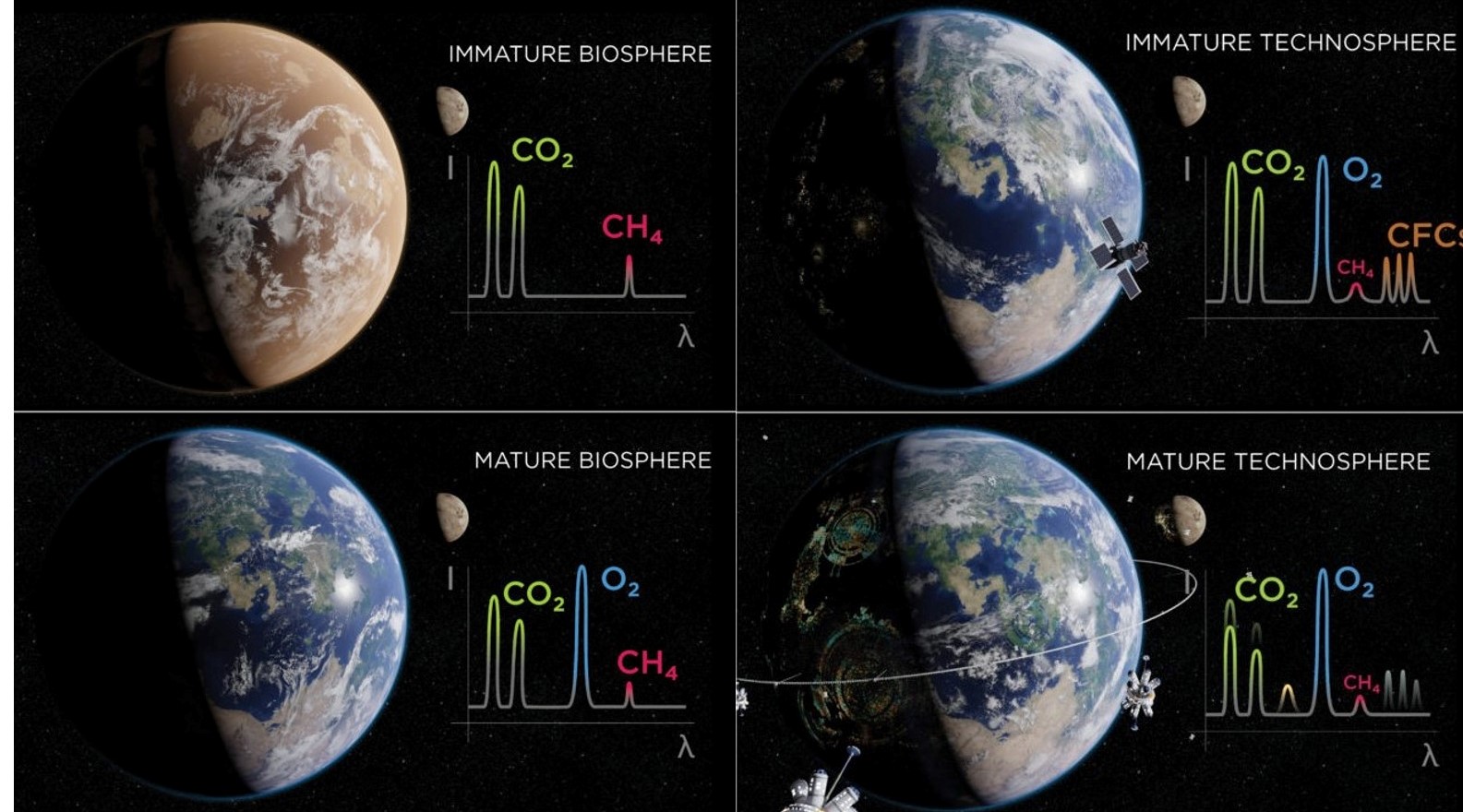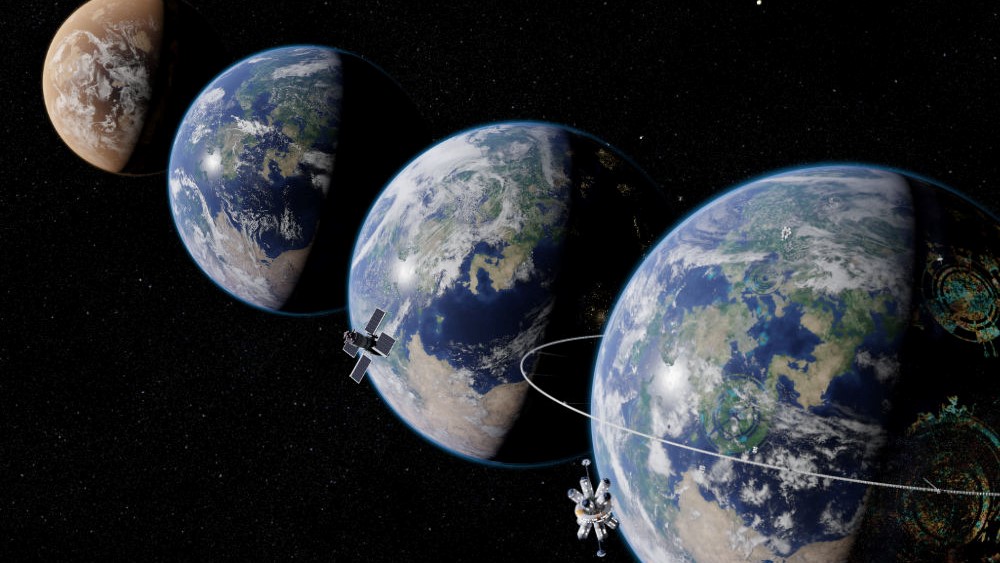Scientists say planetary intelligence is real, but Earth doesn't qualify yet
There is still one big step Earth must take to be "intelligent."
Get the world’s most fascinating discoveries delivered straight to your inbox.
You are now subscribed
Your newsletter sign-up was successful
Want to add more newsletters?

Delivered Daily
Daily Newsletter
Sign up for the latest discoveries, groundbreaking research and fascinating breakthroughs that impact you and the wider world direct to your inbox.

Once a week
Life's Little Mysteries
Feed your curiosity with an exclusive mystery every week, solved with science and delivered direct to your inbox before it's seen anywhere else.

Once a week
How It Works
Sign up to our free science & technology newsletter for your weekly fix of fascinating articles, quick quizzes, amazing images, and more

Delivered daily
Space.com Newsletter
Breaking space news, the latest updates on rocket launches, skywatching events and more!

Once a month
Watch This Space
Sign up to our monthly entertainment newsletter to keep up with all our coverage of the latest sci-fi and space movies, tv shows, games and books.

Once a week
Night Sky This Week
Discover this week's must-see night sky events, moon phases, and stunning astrophotos. Sign up for our skywatching newsletter and explore the universe with us!
Join the club
Get full access to premium articles, exclusive features and a growing list of member rewards.
A group of astrophysicists has proposed that individual planets are capable of developing intelligence — not the kind of smarts like knowing your ABCs, but rather an intelligence associated with the interconnectedness of the life inhabiting them. However, don't assume that our planet is in this intelligent league. Earth is still one major step away from developing true planetary intelligence, a milestone that, if achieved, could help us prevent the impending climate catastrophe, the scientists said.
In the new study, published Feb. 7 in the International Journal of Astrobiology, a group of researchers argues that a planet can be deemed intelligent if it demonstrates cognition — the capacity to know something about what's happening and act on that knowledge. This could happen if nature and technology on planets like Earth can evolve to the point where they are so interconnected that they can recognize potential issues and create feedback loops to counter them.
"To be clear, cognition is not consciousness," the researchers wrote in an article for The Atlantic. "We don't imagine some kind of planetary super-being making self-aware decisions for the world." Instead, the team believes that cognition is a natural product of the relationship between life and the planets on which they develop.
Related: Changing Earth: 7 ideas to geoengineer our planet
However, Earth hasn't entered this stage, at least not yet. "Even though Earth might be full of intelligent life, at this point in its cosmic history, it certainly doesn't seem very smart," they wrote in The Atlantic. But the new study does outline the remaining final hurdle Earth must overcome to gain true planetary intelligence.
The Gaia hypothesis
The new study is built upon a principle known as the Gaia hypothesis, an idea introduced by British scientist James Lovelock and American evolutionary biologist Lynn Margulis in the early 1970s. (Gaia is the personification of Earth from Greek mythology.)
The Gaia hypothesis states that, as life-forms evolve on Earth, they affect the evolution of the planetary system as a whole. The idea is that the biosphere — the global ecological system integrating all living things and their relationships — can physically alter other systems, such as the atmosphere (air), cryosphere (ice), hydrosphere (water) and lithosphere (land). This back-and-forth effect has been happening since life first began on Earth, but it has become more noticeable than ever due to humanity's impacts on the planet, including human-caused climate change, pollution and deforestation.
Get the world’s most fascinating discoveries delivered straight to your inbox.
The researchers wanted to know if this interconnectedness between life and a planet could become so interwoven that the planet could eventually be deemed intelligent. "The biosphere tells us that once life appears in a world, that world can take on a life of its own," the researchers wrote in The Atlantic. "But if a planet with life has a life of its own, can it also have a mind of its own?"
The idea of a collective entity like a planet having some sort of intelligence goes against the notions we have about our own intelligence. "Intelligence tends to be conceived of as something that happens in individual heads, and usually those heads sit on the shoulders of animals like humans," the researchers wrote. However, there are many examples of collective intelligence in the natural world.
For instance, colonies of social insects, like bees, show a collective and often superior intelligence than the individuals that form them. "A single bee holds only a small amount of information about the world, but its colony as a whole knows and responds to the environment," the researchers wrote.
Related: Landsat satellites: 12 amazing images of Earth from space
Recent discoveries about fungal networks, known as mycorrhizal networks, that share water and nutrients between individual trees in forests also reveal a form of collective intelligence. "Such fungal networks allow forests stretching hundreds of miles to recognize and respond to changing conditions," the researchers wrote.
Meanwhile, the human brain is made from trillions of connections between different neurons, meaning our own intelligence is more collective than we think.
Stages of planetary intelligence
The researchers define true planetary intelligence as the point at which all the living systems on a planet work in unison for the benefit of the entire system. This would involve feedback loops in which negative changes to the planet, such as rapid climate change, are identified and counteracted.
"We consider planetary intelligence to be life's collective response to changes in the state of the entire planet," the researchers wrote. "The collective result is that life doesn't doom itself over time."
However, this does not happen overnight, and there are major obstacles planets must overcome before they can be deemed intelligent. In the new study, the researchers propose four main stages in planetary intelligence: immature biosphere, mature biosphere, immature technosphere and mature technosphere.
An immature biosphere is characteristic of Earth when life first emerged, when tiny microbes were the only life-forms on the planet. At that point, the atmosphere was mainly carbon dioxide and methane, which made the planet inhospitable to more advanced life-forms that we see today. "During this early period, life was not yet a major planetary player," the researchers wrote. "There was life, but there were few global feedback loops and hence no emergence of intelligence."
But the microbes created oxygen via photosynthesis, which began to slowly change the chemistry of the atmosphere. This allowed for the development of a mature biosphere, where multicellular life — such as animals and, most importantly, vegetation — emerged and further increased the oxygen in the atmosphere. This oxygen-rich environment allowed the protective ozone layer to form and plants and animals to develop on land and further transform the planet.
"This thick tangle of feedback loops between living and nonliving components comprised a network that could be said to hold and respond to information in a meaningful way," the researchers wrote. "Earth, in other words, started to become smart."
Next, the researchers looked at the technosphere, or the relationship between artificial technology and natural systems. The immature technosphere materialized when humans began to develop technology and build networks for communication, transport, energy and food production. However, at this stage, these technologies come at the expense of the planet by using energy and resources from other living and physical systems. This rapidly transforms the planet by increasing the greenhouse gases in the atmosphere and introducing other damaging pollutants, as well as by destroying physical systems and ecosystems.
Related: 10 Signs that Earth's climate is off the rails
Earth is currently stuck at the immature technosphere stage, the researchers said. Our advancements in energy production are allowing us to achieve some remarkable technologies for ourselves, but those actions are significantly altering the planet. "Our technosphere is, in the long run, working against itself. It's formally stupid," the researchers wrote. "It leaves the entire planet unguided, careening into new and uncharted territory."
If Earth ever reaches the mature technosphere stage — a pivotal feat that would signify that Earth is "intelligent" — the technology on our blue dot will advance to a point where it does not require planetary energy and resources and instead can be used to repair and improve the systems it was destroying. This would allow the technosphere to co-evolve with the biosphere in a way that allows both to thrive.
"This would be a technosphere rooted in the biosphere, which itself is rooted in the other planetary systems — a technosphere that self-maintains the entire Earth system," the researchers wrote.
The final hurdle
Progressing to the final stage of planetary intelligence is more than just a curiosity for the researchers — it is a necessity. They believe that it may be the only way to prevent a climate catastrophe, which is nearing ever closer due to the immaturity of our technosphere.
"Humanity stands at a most precipitous moment in both our and our planet's evolution," the researchers wrote. It is "caught in a climate crisis brought on by our supposed advancement as a civilization."
However, thinking about intelligence on a wider scale could help us solve this problem. "Making sense of how a planet's intelligence might be defined and understood helps shine a little light on humanity's future on this planet — or lack thereof," the researchers wrote.
But it is unclear exactly how we should go about advancing our technosphere, what further discoveries or breakthroughs we need to make in order to do this. "The million-dollar question is figuring out what planetary intelligence looks like and means for us in practice because we don't know how to move to a mature technosphere yet," lead author Adam Frank, an astrophysicist at the University of Rochester in New York, said in a statement.
However, there is hope that humans can help the planet take the final step toward intelligence, because we are smart enough to realize that it is even a possibility. "Humans at least are intelligent enough to comprehend the calamitous direction we're headed in," the researchers wrote. "That level of self-awareness opens some possibility of choice."
Related: 7 ways to prove the Earth is round (without launching a satellite)
In the past, humanity has made some choices that benefit the planet, such as the 1987 establishment of the Montreal Protocol, in which countries around the world agreed to ban hazardous chemicals that were destroying the ozone layer. "That was, perhaps, an early example of what the new version of planetary intelligence could look like," the researchers wrote.
Extraterrestrial technosignatures
The researchers' study focuses mainly on Earth's journey toward intelligence. But the same interconnectedness between life and host planets is likely to be the same on any alien worlds that may harbor life elsewhere in the cosmos.
"We have discovered that the universe is teeming with worlds, many of which might host life and even intelligence," the researchers wrote. However, current searches for intelligence tend to focus on whether planets might harbor intelligent life and not on whether the planets are intelligent themselves, they added.
Most alien-life hunters are focused on finding evidence of an intelligent species reaching outward, such as radio signals. But examples of planetary intelligence, known as technosignatures, are more likely to be on the planets themselves, like solar panels or pollution.
"Understanding planetary intelligence might help point the way to knowing what kind of technosignatures we should be looking for, as well as how to look for them," the researchers wrote. Frank is now the principal investigator on the first NASA project looking for non-radio technosignatures, according to the statement.
Originally published on Live Science.

Harry is a U.K.-based senior staff writer at Live Science. He studied marine biology at the University of Exeter before training to become a journalist. He covers a wide range of topics including space exploration, planetary science, space weather, climate change, animal behavior and paleontology. His recent work on the solar maximum won "best space submission" at the 2024 Aerospace Media Awards and was shortlisted in the "top scoop" category at the NCTJ Awards for Excellence in 2023. He also writes Live Science's weekly Earth from space series.
 Live Science Plus
Live Science Plus














